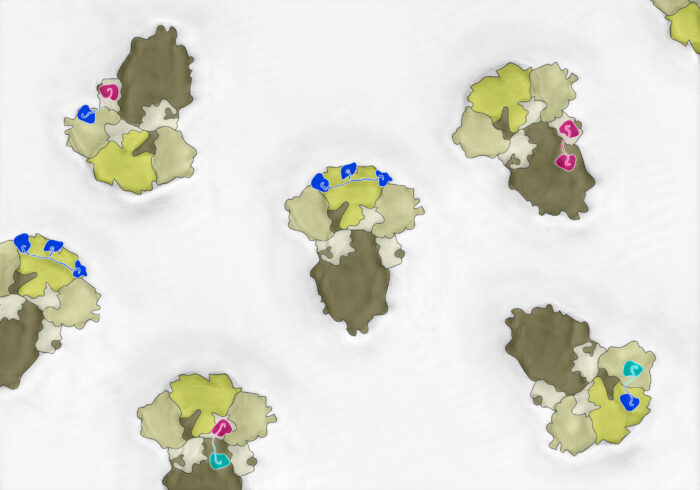New class of antivirals with replaceable building blocks maintain activity against different SARS-CoV-2 strains

The SARS-CoV-2 pandemic demonstrates how quickly we can find ourselves desperately needing new antivirals and therapeutics. But antivirals, typically small molecule drugs or antibodies, can be challenging to develop or deploy. Working together, Cambridge-based biotechnology company Bicycle Therapeutics (an LMB spinout company founded by Greg Winter) and a research team in LMB led by Leo James in the LMB’s PNAC Division have developed a new class of antivirals that combine that advantages of both whilst minimizing their disadvantages.
This new class of antiviral exploits molecules called Bicycles – short peptides wrapped around a small molecule kernel. As well as being highly stable, new Bicycles can be generated quickly in a manner analogous with how our bodies make new antibodies. To make an antiviral Bicycle against SARS-CoV-2, the team used a technology called ‘Phage Display’ (developed by Greg Winter, for which he shared the 2018 Nobel Prize in Chemistry) to select molecules capable of binding the viral Spike protein from a pool of billions of differently shaped molecules. Unlike antibodies, which tend to recognize only parts of a protein surface, Bicycles small size meant that molecules were found against every part of Spike.
In order to turn the selected Bicycles into antivirals, Marina Vaysburd and Donna Mallery developed an assay to test for antiviral activity quickly and safely in the lab. By using individual Bicycles like building blocks and joining them together, it was possible to greatly increase how tightly they hold on to Spike. By coating Spike in these Bicycles, the viral protein was no longer able to stick to cells and mediate infection. Anna Albecka demonstrated that Bicycles could inhibit clinical strains of the virus, using a new high containment facility that she, together with LMB staff Jillian Deans and Stephen Holmes, had established during lockdown.
The researchers took their building block strategy one step further, combining different Bicycles that target different parts of Spike. This generated antivirals that don’t need to prevent binding to cells but work by locking together parts of Spike that normally have to move. Moreover, by using this strategy, it was possible to reconfigure antiviral Bicycles as new variants of concern (VoCs) emerged: By carefully choosing Bicycles that target the parts of Spike that are similar between VoCs.
In a collaboration with the University of Liverpool, several of the most potent antiviral Bicycles were shown to be capable of clearing virus from infected mice and preventing a hyper-inflammatory response, which is a hallmark of Covid19 pathology. These results suggest anti-CoV2 Bicycles have the potential to be developed into effective SARS-CoV-2 therapeutics.
The current study demonstrates that Bicycles can be used as a molecular toolbox, which when combined together like building blocks can have different antiviral mechanisms and maintain activity against diverse viral strains. This strategy could be used to generate new antivirals against other viruses, not just SARS-CoV-2.
This work was funded by UKRI MRC, the Wellcome Trust, UKRI EPSRC and Unitaid and Innovate UK.
Further references
Multivalent bicyclic peptides are an effective antiviral modality that can potently inhibit SARS-CoV-2 Gaynor, KU., Vaysburd, M., Harman, MAJ., Albecka, A., Jeffrey, P., Beswick, P., Papa, G., Chen, L., Mallery, D., McGuinness, B., Van Rietschoten, K., Stanway, S., Brear, P., Lulla, A., Ciazynska, K., Chang, VT., Sharp, J., Neary, M., Box, H., Herriott, J., Kijak, E., Tatham, L., Bentley, EG., Sharma, P., Kirby, A., Han, X., Stewart, JP., Owen, A., Briggs, JAG., Hyvönen, M., Skynner, MJ., James, LC. Nature Communications
Leo’s group page
Bicycle Therapeutics
LMB COVID-19 response
LMB Technology Transfer – Bicycle Therapeutics Ltd
Previous Insight on Research articles
Testing the capacity for intracellular antibodies to neutralise SARS-CoV-2
Furin protease is not essential for SARS-CoV-2 infection